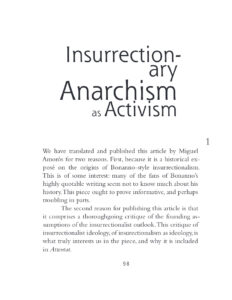

These writings were originally published inside of Attentat by Aragorn!
Attentat is intended to explore the collision between anarchist and nihilist ideas.
Selected quotes from Insurrectionary Anarchism As Activism:
Amorós critiques the hidden activist ideology in insurrectionalism through the figure of Bonanno. Bonanno has had significant influence in the US, and all over the world, for that matter, but we are not interested in tracing his influence in particular.
Amorós accurately pinpoints the vague echo of such a line in the commonplaces of insurrectionalism. If the masses were not revolting, it was up to a more advanced group to revolt first. From these ideas, it is not far to say the group that attacks has the consciousness that the masses lack, and that they are not only revolting first but *for* them, so that they may see the open possibility of revolt. The vanguard no longer leads, it attacks first. Is it not still a vanguard?
The acts are technique, reduced to what can be easily done and reproduced. And reproducibility is perhaps what has gotten the US milieu to make the most reproducible acts (window smashing, for example) into its currency.
[…] the least we can say is that we have yet to see insurrectionary acts be anything more than themselves—anything more than reproducible. Those who imitate them are influenced by the same simplistic ideas. The masses remain motionless.
If North American insurrectionaries were to undertake and explain their actions differently, as something done for their own satisfaction, or from an advocacy of destruction for its own sake, we would no longer consider this critique relevant. But to continue to suggest that revolt will spread because easily reproducible actions do deserve a skepticism like that of Amorós. His critique of the mutated vanguardism of insurrectionalism is that its “activism not only substitutes for such struggles, it also sets itself up as the radical spectacle of such struggles.” We would only say that we are even more skeptical, because we have no idea how revolutions are really made, or if a revolution is what we want as opposed to a more comprehensive undoing of the world as we know it. To Amorós’ anti-vanguardist, Situationist-influenced critique, we add our nihilist one: we don’t even know if the conscious masses are possible.
We could therefore call many if not all of US insurrectionary anarchists activists, if only because their adherence to the simple idea of taking action is ideological. That ideology, the faith in action as opposed to waiting (there is a difference between waiting for the masses and waiting because conditions are uncertain), should be called activism, shouldn’t it?
[…] How funny; how painful; how apt. Because US anarchists know DIY so well, they traded up from collectives, skillshares, and puppets to insurrectionary acts, without knowing that the realness they were reaching for, and would soon be claiming and demanding of everyone around them, was merely a riskier variant of, not a real break with, all of their activism so far.
Submitted Anonymously Over Email
